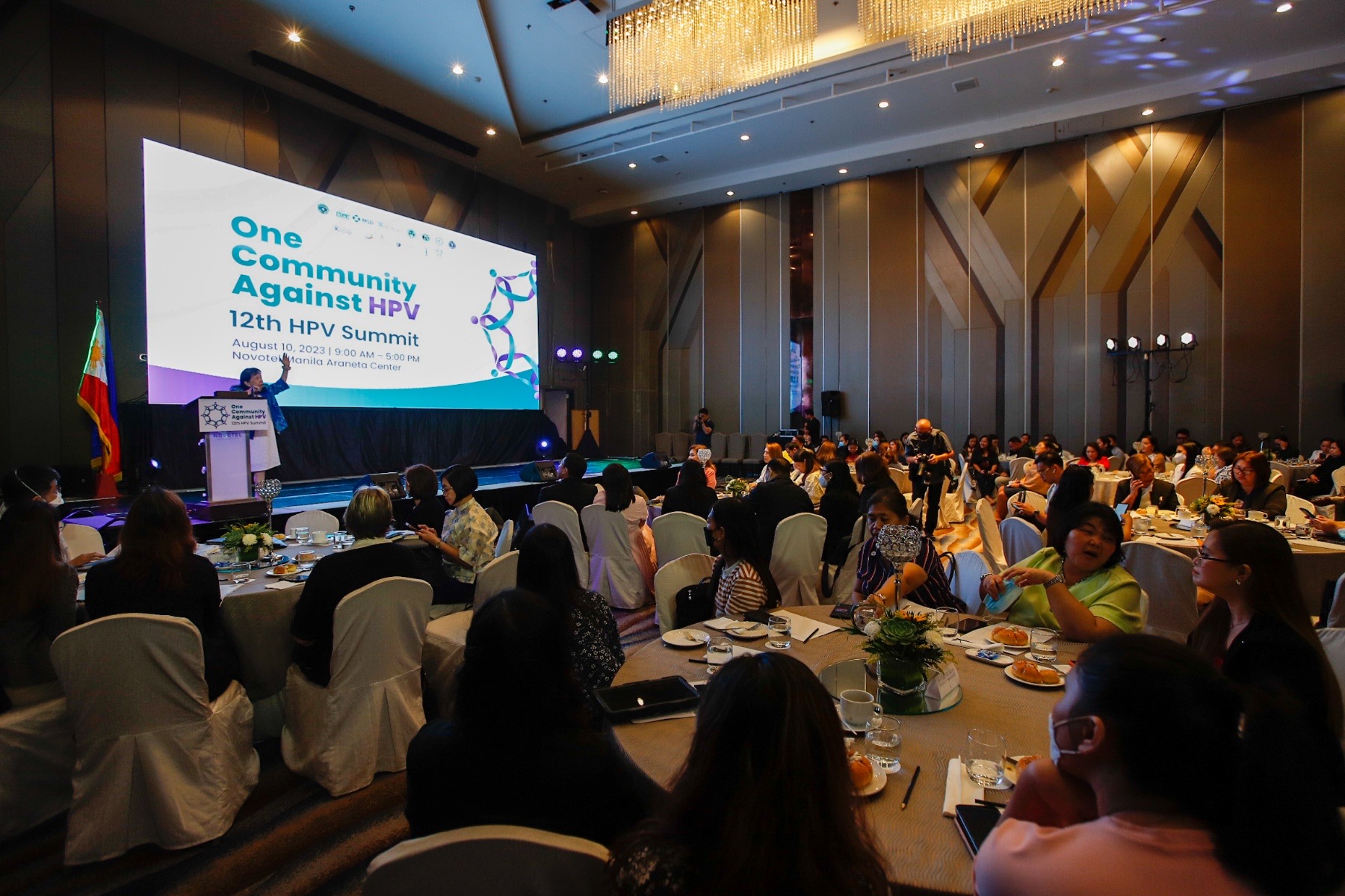Health advocates, professionals unite vs HPV, cervical cancer in QC
Health advocates and professionals from various health organizations on Thursday, Aug. 10, joined the “12th HPV Summit” held at Novotel Manila in Araneta City, Quezon City to discuss strategies, share knowledge, and call for support from different sectors in the campaign to eliminate human papillomavirus (HPV) and cervical cancer in the Philippines.
The event, themed “One Community Against HPV,” was launched through the partnership of different health organizations, agencies, and private companies in the country including the Department of Health (DOH), Pharmaceutical Healthcare Association of the Philippines, Merck, Sharp & Dohme (MSD) Philippines, AC Health, Philippine Obstetrical and Gynecological Society, the Society of Adolescent Medicine of the Philippines, and Cancer Warriors Foundation, among others
According to the organizations, the summit aims to increase awareness of the benefits of HPV vaccination and screening as protection against cervical cancer among all stakeholders; to encourage key stakeholders (including local government units and private sector) to expand inoculation among age groups and beyond the current targets; and to unite the community by creating a strong alliance against the disease.
It serves as a platform for inclusive discussion bringing experts, policymakers, healthcare professionals, representatives from various sectors, and stakeholders together to tackle plans, share best practices and reaffirm their commitment in protecting at-risk populations against HPV, a sexually transmitted disease that can cause different types of cancer to individuals.

The summit featured different sessions where the participants got involved in discussions addressing barriers in their campaign against HPV such as limited healthcare resources, geographical challenges, and socioeconomic disparities, with a goal of bridging the gap and provide equal opportunities for vulnerable populations to receive the necessary care and support.
Officials of the organizations, Department of Education, and local government units shared their messages of commitment towards cervical cancer elimination in the country during the program.
They also tackled strategic plans to foster healthcare implementation and literacy within educational settings, focusing on adolescent health and the significance of empowering young individual to become healthy adults through targeted programs and initiatives such as the school-based immunization program.
In her speech relayed by DOH Cancer Control Program Division Chief Dr. Jan Llevado, Undersecretary of Health Dr. Maria Rosario Vergeire said that cervical cancer has caused about 341,831 deaths in the world, where 4,052 women died in the Philippines based on the report from Global Cancer Observatory (Globocan) in 2020.
She added that cervical cancer comes second in cancer-related deaths in the world; fourth leading cause of death and second leading cause of new cancer cases in Filipino women (1,052 deaths in 2020).
“As we know, cervical cancer is perhaps the most significant diseases associated with HPV infection, hence, it is only appropriate that we tackle it in this summit. Risk factors associated with cervical cancer are also associated with increased risk of aquiring or having a compromised immune response to HPV,” she said.
She said that the DOH is utilizing a strategy revolving around World Health Organization’s (WHO) “90-70-90” targets which calls for accelerated action in prevention, screening, and cancer management for young women that must be met by countries to be on the path towards cervical cancer elimination by 2030.
The strategy aims for 90 percent of girls in the countries to get fully vaccinated with HPV vaccine by age 15 years; 70 percent of women, aged 35 and 45, screened with a high-performance test; and 90 percent of women diagnosed with cervical cancer to receive timely and appropriate treatment and care by 2030.
The targets will be achieved when all countries reach an annual cervical cancer incidence rate of four cases per 100,000 women or lower, according to the WHO.
Aside from launching awareness campaigns against the disease , the DOH undersecretary said that they are working to increase the coverage of HPV screening, vaccination, and delivery of services in the country by collaborating with various partners to enhance immunization efforts for young women, utilizing facilities (including hospitals, health and cancer centers, and schools), equipment, implementation of programs involving concerned national government agencies, and training more health professionals in line with said WHO targets.
Vergeire said that in recognition to the burden brought by the said type of cancer in the country, they pushed for the enactment of the Republic Act 11215 or the National Integrated Cancer Control Act (NICCA), which became a law 2019, to continue to improve the delivery of services by increasing access to cancer centers, and provide financial assistance to patience, among others.
Through the Republic Act, the health undersecretary said the are able to establish different programs and a council involving different national government agencies and cancer patient groups that serves as a multi-sectoral policy-making, planning and coordination to cancer prevention and control.
“We must empower and involve community leaders, advocacy groups, and civil society organizations to amplify our message and ensure that our efforts resonate across every corner of the country,” Vergeire said.
During the program, officials from the local government units of Muntinlupa, Tarlac, and Santo Tomas in Batangas also showcased various initiatives to address cervical cancer anad HPV elimination such as the establishments of health centers and other facilities, acquiring ambulances an other vehicles for health, creation of cervical cancer prevention groups,immunization, and other health programs.
“At this critical juncture, there is a resounding call for individuals, organizations, and communities to join the collective effort against HPV. Multi-stakeholder collaboration is crucial in raising awareness, promoting vaccination, and advocating for equitable access to healthcare services. Together, let us make a profound impact on the health and well-being of our communities,” the organizations said.